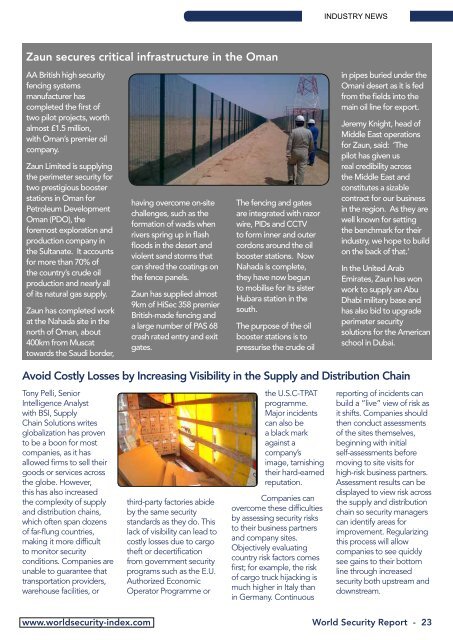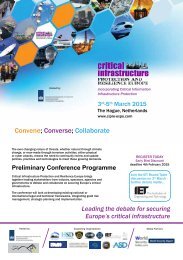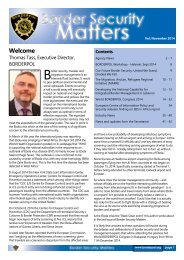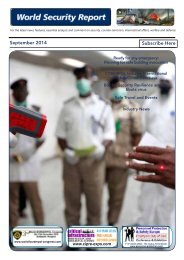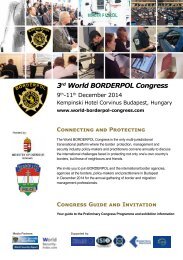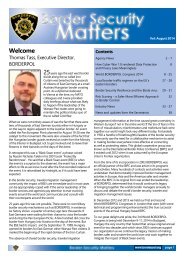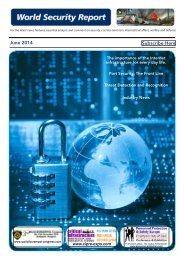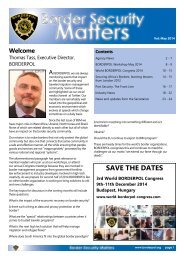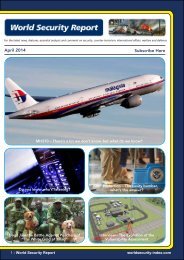World Security Report Jan 2015
World Security Report is a prime source of online information and analysis on security, counter-terrorism, international affairs and defence
World Security Report is a prime source of online information and analysis on security, counter-terrorism, international affairs and defence
You also want an ePaper? Increase the reach of your titles
YUMPU automatically turns print PDFs into web optimized ePapers that Google loves.
INDUSTRY NEWS<br />
Zaun secures critical infrastructure in the Oman<br />
AA British high security<br />
fencing systems<br />
manufacturer has<br />
completed the first of<br />
two pilot projects, worth<br />
almost £1.5 million,<br />
with Oman’s premier oil<br />
company.<br />
Zaun Limited is supplying<br />
the perimeter security for<br />
two prestigious booster<br />
stations in Oman for<br />
Petroleum Development<br />
Oman (PDO), the<br />
foremost exploration and<br />
production company in<br />
the Sultanate. It accounts<br />
for more than 70% of<br />
the country’s crude oil<br />
production and nearly all<br />
of its natural gas supply.<br />
Zaun has completed work<br />
at the Nahada site in the<br />
north of Oman, about<br />
400km from Muscat<br />
towards the Saudi border,<br />
having overcome on-site<br />
challenges, such as the<br />
formation of wadis when<br />
rivers spring up in flash<br />
floods in the desert and<br />
violent sand storms that<br />
can shred the coatings on<br />
the fence panels.<br />
Zaun has supplied almost<br />
9km of HiSec 358 premier<br />
British-made fencing and<br />
a large number of PAS 68<br />
crash rated entry and exit<br />
gates.<br />
The fencing and gates<br />
are integrated with razor<br />
wire, PIDs and CCTV<br />
to form inner and outer<br />
cordons around the oil<br />
booster stations. Now<br />
Nahada is complete,<br />
they have now begun<br />
to mobilise for its sister<br />
Hubara station in the<br />
south.<br />
The purpose of the oil<br />
booster stations is to<br />
pressurise the crude oil<br />
in pipes buried under the<br />
Omani desert as it is fed<br />
from the fields into the<br />
main oil line for export.<br />
Jeremy Knight, head of<br />
Middle East operations<br />
for Zaun, said: ‘The<br />
pilot has given us<br />
real credibility across<br />
the Middle East and<br />
constitutes a sizable<br />
contract for our business<br />
in the region. As they are<br />
well known for setting<br />
the benchmark for their<br />
industry, we hope to build<br />
on the back of that.’<br />
In the United Arab<br />
Emirates, Zaun has won<br />
work to supply an Abu<br />
Dhabi military base and<br />
has also bid to upgrade<br />
perimeter security<br />
solutions for the American<br />
school in Dubai.<br />
Avoid Costly Losses by Increasing Visibility in the Supply and Distribution Chain<br />
Tony Pelli, Senior<br />
Intelligence Analyst<br />
with BSI, Supply<br />
Chain Solutions writes<br />
globalization has proven<br />
to be a boon for most<br />
companies, as it has<br />
allowed firms to sell their<br />
goods or services across<br />
the globe. However,<br />
this has also increased<br />
the complexity of supply<br />
and distribution chains,<br />
which often span dozens<br />
of far-flung countries,<br />
making it more difficult<br />
to monitor security<br />
conditions. Companies are<br />
unable to guarantee that<br />
transportation providers,<br />
warehouse facilities, or<br />
third-party factories abide<br />
by the same security<br />
standards as they do. This<br />
lack of visibility can lead to<br />
costly losses due to cargo<br />
theft or decertification<br />
from government security<br />
programs such as the E.U.<br />
Authorized Economic<br />
Operator Programme or<br />
the U.S.C-TPAT<br />
programme.<br />
Major incidents<br />
can also be<br />
a black mark<br />
against a<br />
company’s<br />
image, tarnishing<br />
their hard-earned<br />
reputation.<br />
Companies can<br />
overcome these difficulties<br />
by assessing security risks<br />
to their business partners<br />
and company sites.<br />
Objectively evaluating<br />
country risk factors comes<br />
first; for example, the risk<br />
of cargo truck hijacking is<br />
much higher in Italy than<br />
in Germany. Continuous<br />
reporting of incidents can<br />
build a “live” view of risk as<br />
it shifts. Companies should<br />
then conduct assessments<br />
of the sites themselves,<br />
beginning with initial<br />
self-assessments before<br />
moving to site visits for<br />
high-risk business partners.<br />
Assessment results can be<br />
displayed to view risk across<br />
the supply and distribution<br />
chain so security managers<br />
can identify areas for<br />
improvement. Regularizing<br />
this process will allow<br />
companies to see quickly<br />
see gains to their bottom<br />
line through increased<br />
security both upstream and<br />
downstream.<br />
www.worldsecurity-index.com<br />
<strong>World</strong> <strong>Security</strong> <strong>Report</strong> - 23


